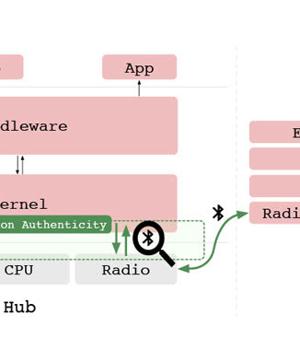Security News > 2021 > August > Researchers Propose Machine Learning-based Bluetooth Authentication Scheme

A group of academics has proposed a machine learning approach that uses authentic interactions between devices in Bluetooth networks as a foundation to handle device-to-device authentication reliably.
Called "Verification of Interaction Authenticity", the recurring authentication scheme aims to solve the problem of passive, continuous authentication and automatic deauthentication once two devices are paired with one another, which remain authenticated until an explicit deauthentication action is taken, or the authenticated session expires.
To this end, the recurring validation of interaction patterns allows for authenticating the device by cross-checking the device's behavior against a previously learned machine learning model that represents typical, trustworthy interactions, with the first authentication factor being the use of traditional Bluetooth identifiers and credentials.
The dataset consists of a collection of 300 Bluetooth HCI network traces that capture interactions between 20 distinct smart health and smart home devices and 13 different smartphone apps installed on a Nexus 5 smartphone running Android 6.0.1.
"We see VIA's recurring verification of interaction patterns as a sort of second factor for authenticating the device," the researchers said.
"As a result of this scheme, we introduce the notion of recurring behavioral authentication for Bluetooth connections, which can be integrated into a Bluetooth gateway device, such as a smartphone."